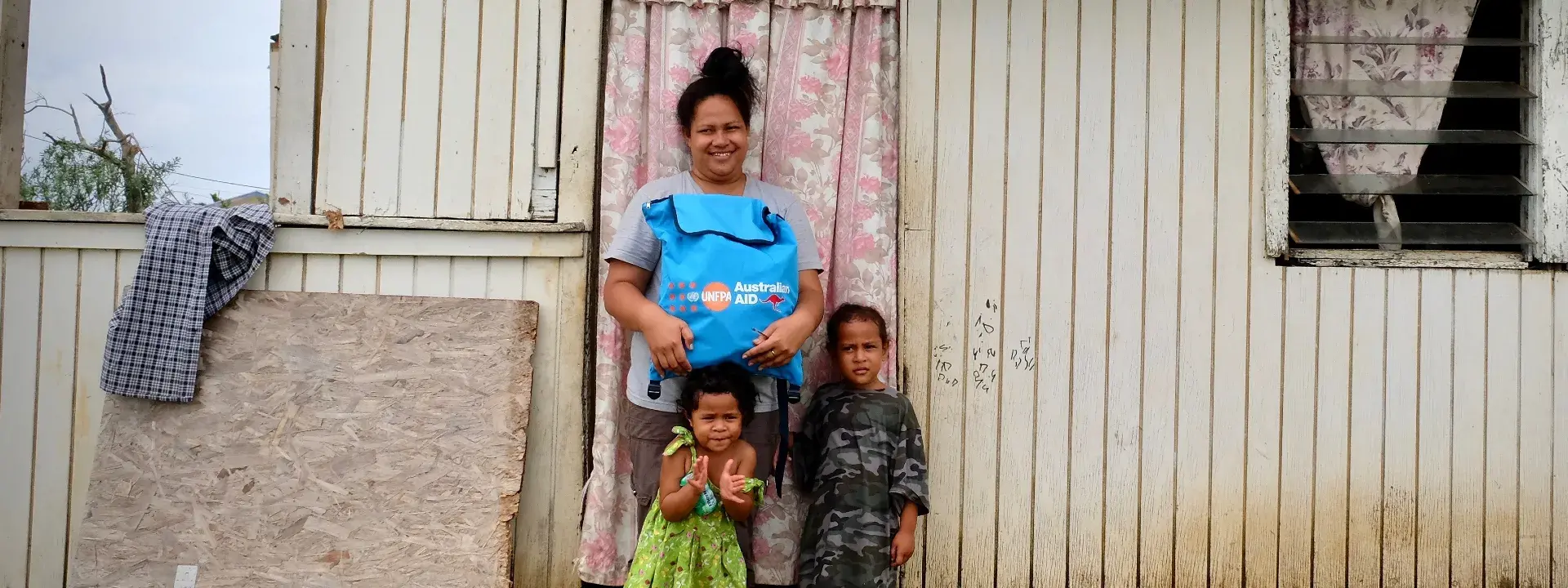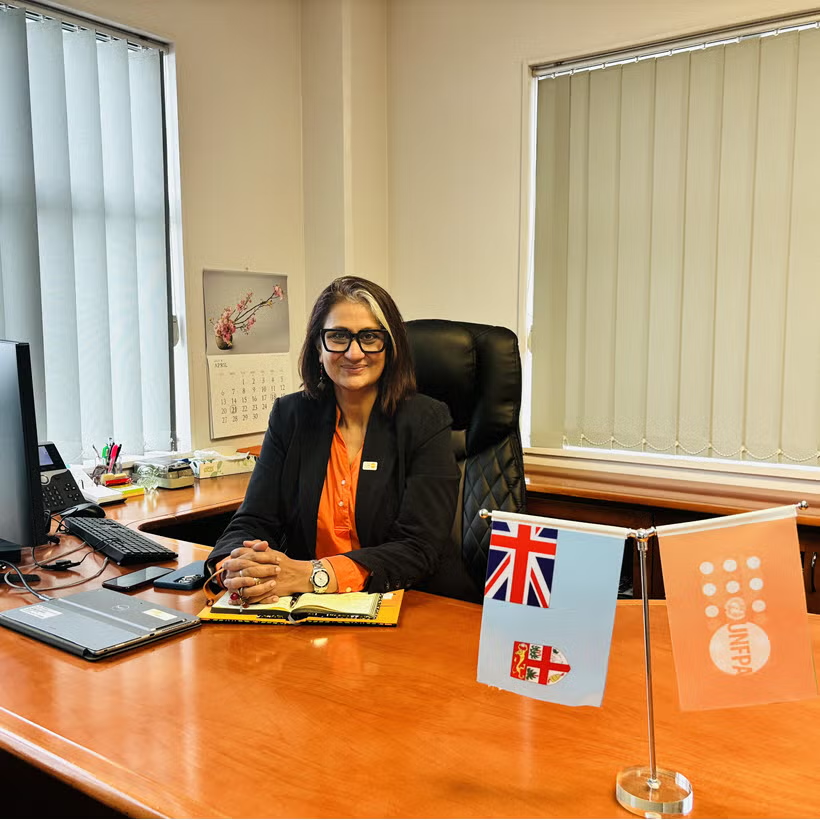UNFPA in Pacific Island Countries
United Nations Population Fund (UNFPA) is the United Nations sexual and reproductive health agency. Our mission is to deliver a world where every pregnancy is wanted, every childbirth is safe and every young person's potential is fulfilled.
UNFPA’s Pacific main office, located in Suva, Fiji, currently assists 14 countries and territories in the South Pacific: The Cook Islands, the Federated States of Micronesia, Fiji, Kiribati, the Marshall Islands, Nauru, Niue, Palau, Samoa, Solomon Islands, Tokelau, Tonga, Tuvalu, and Vanuatu. The office additionally provides technical assistance to Papua New Guinea.
UNFPA works to extend family planning and emergency obstetric care, advocates for stronger protection policies, mobilizes communities against violence and supports services for survivors. UNFPA also supports efforts to improve adolescent sexual and reproductive health.
INTERNATIONAL CONFERENCE ON POPULATION AND DEVELOPMENT (ICPD)- In 1994, 179 countries adopted a landmark Programme of Action during the International Conference on Population and Development (ICPD), held in Cairo, Egypt. The ICPD Programme of Action transformed the way in which linkages between population, poverty reduction, and sustainable development. At the heart of the ICPD Programme are sustainable development and the Leave No One Behind global goals as it adopted the 2030 Agenda for Sustainable Development and the Sustainable Development Goals (SDGs). In context to the 2030 Agenda for Sustainable Development, the program pledged to undertake further actions to ensure its “full, effective and accelerated implementation”. The future of sustainable development is directly linked to fulfilling the aspirations of adolescents and youth. Empowering young people and unleashing their full potential to contribute to economic and social progress will be instrumental for bringing the vision and the promise of the ICPD Programme of Action and the 2030 Agenda for Sustainable Development to life. Focus on the three zero’s (0’s) down below:
ZERO UNMET NEED FOR FAMILY PLANNING
The Government of Australia has contributed $A30 million to UNFPA Pacific for a new four-year program to transform the lives of women, adolescents, and youth in the Pacific sub-region by reducing the unmet need for family planning and strengthening sexual and reproductive health services.
UNFPA works with governments and partners to promote universal access to quality, integrated sexual and reproductive health services. UNFPA also promotes comprehensive sexuality education and youth leadership, which empower young people to exercise autonomy, choice, and participation in their sexual and reproductive health and rights.
ENDING PREVENTABLE MATERNAL DEATH
Since UNFPA started working in the Pacific region, the number – and rate – of women dying from pregnancy or childbirth has been minimized. Yet maternal deaths in many parts of the Pacific region remain unacceptably high. One of the most challenging aspects of reducing maternal death is finding ways to reach all pregnant women, even those in the poorest, most remote areas, or in times of natural or man-made disasters. This involves strengthening health systems.
We know how to safeguard the health of pregnant women and new mothers. The first step is to ensure that women can plan their pregnancies and space their births. UNFPA also partners with governments and others to strengthen health systems, train health workers, educate and deploy midwives and improve access to the full range of reproductive health.
ENDING GENDER-BASED VIOLENCE AND HARMFUL PRACTICES
Persistent discrimination and gender-based violence remain widespread, and harmful practices - such as prenatal sex selection - reinforce gender inequality across the region.
UNFPA works to prevent and respond to gender-based violence through its work with policymakers, justice systems, health systems, and humanitarian partners. UNFPA also focuses on eliminating harmful practices and helps to engage men and boys to advance gender equality.
LEAVING NO ONE BEHIND
A lot more needs to be done to ensure that all individuals can exercise their basic human rights. This includes persons with disabilities, older persons, and young people.
Youth’s reproductive choices will shape future demographic trends and UNFPA advocates for the rights of young people, including the right to accurate information and services related to sexuality and reproductive health. UNFPA advocates for a life-cycle approach by investing in health and well-being from pregnancy through childbirth, childhood, and adolescence, and on to adulthood and eventually old age, cultivating community involvement in the process and emphasizing the rights of individuals of all ages. UNFPA has long worked to improve coverage and quality of health services for those considered most marginalized. Our Strategic Plan includes both specific outcomes and outputs that focus on the needs and rights of these groups, and 90 percent of UNFPA outcome indicators can be disaggregated by sex, age, residence, and wealth quintile to track both our reach and impact.
HUMANITARIAN EMERGENCIES
The South Pacific region is one of the most disaster-prone regions in the world, in terms of recurrence, severity, and scope of the natural disaster, with exposure to cyclones, tsunamis, floods, droughts, etc. During conflicts, natural disasters, and public health emergencies, sexual and reproductive health needs are often overlooked – with staggering consequences. Pregnant women risk life-threatening complications without access to delivery and emergency obstetric care services. Women and girls may lose access to family planning services, exposing them to unintended pregnancy in perilous conditions.
UNFPA is on the ground before, during, and after crises, working closely with governments, local NGOs, UN agencies, and other strategic partners to ensure that sexual reproductive health and rights and responses to gender-based violence are integrated into emergency responses. Every day, UNFPA ships hundreds of hygiene supplies and reproductive health kits to crisis settings, providing core life-saving services. UNFPA also deploys trained personnel such as the midwives through south-south cooperation and provides other crucial support to affected populations, to ensure the needs of women and girls are served through preparedness, emergency, and reconstruction phases.




